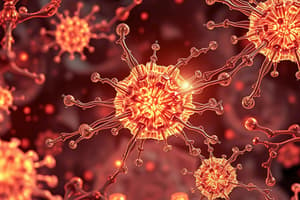Podcast
Questions and Answers
What are the three major categories of 'cancer genes'?
What are the three major categories of 'cancer genes'?
- Proto-oncogenes, mutator genes, apoptosis genes
- Immune response genes, metabolic genes, differentiation genes
- Oncogenes, tumor suppressor genes, DNA repair genes (correct)
- Metastasis genes, angiogenesis genes, cell cycle genes
What is the central importance of the p53 gene product in cancer genetics?
What is the central importance of the p53 gene product in cancer genetics?
- Regulation of cell cycle and initiation of apoptosis (correct)
- Inhibition of DNA repair and mutagenesis
- Promotion of angiogenesis and metastasis
- Regulation of telomerase activity and cellular senescence
How do the following cancer genes deregulate cell growth and differentiation: APC, p53, & NF1?
How do the following cancer genes deregulate cell growth and differentiation: APC, p53, & NF1?
- APC inhibits Wnt signaling, p53 regulates cell cycle, NF1 regulates Ras signaling (correct)
- APC induces apoptosis, p53 activates DNA repair, NF1 promotes cell cycle progression
- APC activates telomerase, p53 promotes metastasis, NF1 inhibits DNA repair
- APC promotes angiogenesis, p53 inhibits cell adhesion, NF1 inhibits apoptosis
What is the function of telomerase in cancer?
What is the function of telomerase in cancer?
What is the main function of the p53 protein?
What is the main function of the p53 protein?
Which type of genes enhance cell proliferation when activated?
Which type of genes enhance cell proliferation when activated?
What is the role of cyclins in cell cycle regulation?
What is the role of cyclins in cell cycle regulation?
Which proteins can inactivate the complex formed by cyclin-dependent kinases and cyclins?
Which proteins can inactivate the complex formed by cyclin-dependent kinases and cyclins?
What is the mechanism through which Ras becomes an oncogenic protein?
What is the mechanism through which Ras becomes an oncogenic protein?
Which gene product is centrally important in cancer genetics?
Which gene product is centrally important in cancer genetics?
What is the function of telomerase in cancer?
What is the function of telomerase in cancer?
Which proteins are modified or expressed inappropriately in the context of cancer genetics?
Which proteins are modified or expressed inappropriately in the context of cancer genetics?
What is the main role of DNA repair genes in cancer?
What is the main role of DNA repair genes in cancer?
Which molecule can bind to a growth factor receptor and signal without the ligand being bound?
Which molecule can bind to a growth factor receptor and signal without the ligand being bound?
What is the function of the CKI protein p21 in cancer genetics?
What is the function of the CKI protein p21 in cancer genetics?
Which gene is responsible for maintaining the integrity of the genome?
Which gene is responsible for maintaining the integrity of the genome?
Which proteins are involved in integrating both apoptotic and anti-apoptotic signals in cells?
Which proteins are involved in integrating both apoptotic and anti-apoptotic signals in cells?
What is the function of telomerase in cells?
What is the function of telomerase in cells?
Which pathway is induced by growth factor withdrawal, cell injury, or high intracellular calcium?
Which pathway is induced by growth factor withdrawal, cell injury, or high intracellular calcium?
Which protein is responsible for inhibiting its co-receptor smoothened?
Which protein is responsible for inhibiting its co-receptor smoothened?
What is the main function of p53 in relation to apoptosis?
What is the main function of p53 in relation to apoptosis?
Which protein family are cysteine proteases that are activated from zymogens by proteolysis?
Which protein family are cysteine proteases that are activated from zymogens by proteolysis?
What is the consequence of loss of NF-1 (Neurofibromin, a GAP)?
What is the consequence of loss of NF-1 (Neurofibromin, a GAP)?
Which pathway involves Fas/CD95, TNF1, and Death Receptor 3?
Which pathway involves Fas/CD95, TNF1, and Death Receptor 3?
What may make cancer cells resistant to apoptosis?
What may make cancer cells resistant to apoptosis?
What is the main function of telomerase in relation to cell proliferation?
What is the main function of telomerase in relation to cell proliferation?
Which proteins are involved in hormone and growth factor signaling pathways?
Which proteins are involved in hormone and growth factor signaling pathways?
What is the main consequence of dysregulation of normal functions in cancer progression?
What is the main consequence of dysregulation of normal functions in cancer progression?
Flashcards are hidden until you start studying
Study Notes
Cancer Genetics and Apoptosis Overview
- p53 induces transcription of p21 Tumor Suppressors and Ras family, involved in hormone and growth factor signaling pathways
- Loss of NF-1 (Neurofibromin, a GAP) leads to neurofibromatosis
- Tumor suppressors and oncogenes can work together normally, e.g., Patched inhibits its co-receptor smoothened
- Telomerase maintains telomere length to prevent senescence and limit cell divisions
- Apoptosis is programmed cell death, removing damaged cells through two pathways: death receptor and mitochondrial integrity
- Caspases are cysteine proteases that are activated from zymogens by proteolysis
- Bcl-2 family of proteins integrate both apoptotic and anti-apoptotic signals in cells
- Death receptor pathway involves Fas/CD95, TNF1, and Death Receptor 3, leading to caspase activation
- Mitochondrial integrity pathway is induced by growth factor withdrawal, cell injury, or high intracellular calcium
- Mutations in oncogenes may make cancer cells resistant to apoptosis, such as the PDGF/Akt/BAD pathway
- Dysregulation of normal functions is key to cancer progression, with genes mutated in cancer being categorized as oncogenes, tumor suppressors, or DNA repair
- Cell cycle control requires normal function of tumor suppressors and oncogenes, while telomerase can enhance cell proliferation by maintaining chromosome ends
Studying That Suits You
Use AI to generate personalized quizzes and flashcards to suit your learning preferences.




